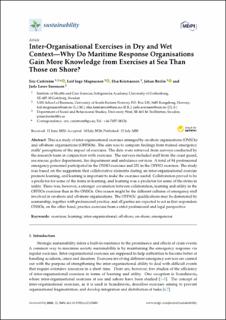Inter-Organisational Exercises in Dry and Wet Context—Why Do Maritime Response Organisations Gain More Knowledge from Exercises at Sea Than Those on Shore?
Original version
Carlström, E., Magnussen, L. I., Kristiansen, E., Berlin, J., & Sørensen, J. L. (2020). Inter-Organisational Exercises in Dry and Wet Context—Why Do Maritime Response Organisations Gain More Knowledge from Exercises at Sea Than Those on Shore?. Sustainability, 12(14), 5604. https://doi.org/10.3390/su12145604Abstract
This is a study of inter-organisational exercises arranged by on-shore organisations (ONSOs) and off-shore organisations (OFFSOs). The aim was to compare findings from trained emergency staffs’ perceptions of the impact of exercises. The data were retrieved from surveys conducted by the research team in conjunction with exercises. The surveys included staff from the coast guard, sea rescue, police department, fire department and ambulance services. A total of 94 professional emergency personnel participated in the ONSO exercises and 252 in the OFFSO exercises. The study was based on the suggestion that collaborative elements during an inter-organisational exercise promote learning, and learning is important to make the exercises useful. Collaboration proved to be a predictor for some of the items in learning, and learning was a predictor for some of the items in utility. There was, however, a stronger covariation between collaboration, learning and utility in the OFFSOs exercises than in the ONSOs. One reason might be the different cultures of emergency staff involved in on-shore and off-shore organisations. The OFFSOs’ qualifications may be dominated by seamanship, together with professional practice, and all parties are expected to act as first responders. ONSOs, on the other hand, practice exercises from a strict professional and legal perspective.

